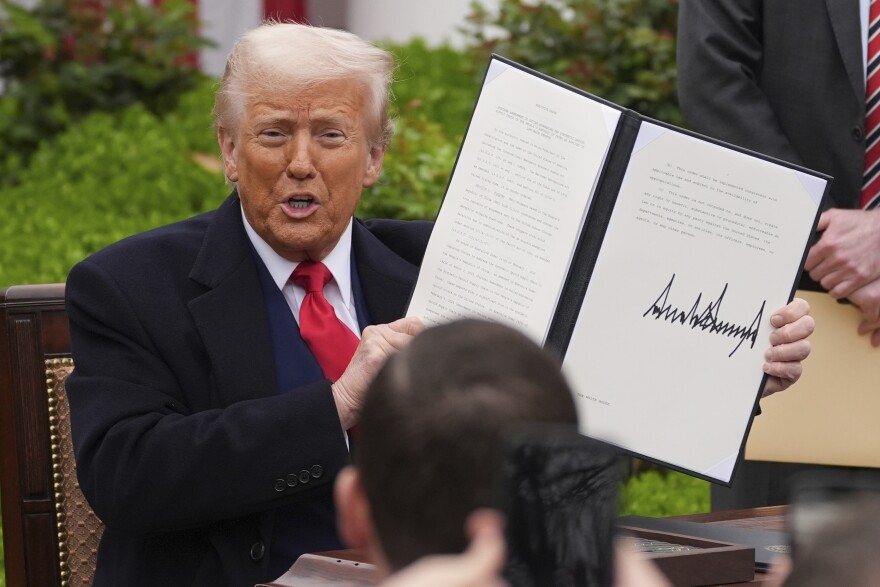BETHLEHEM, Pa. — Lehigh Valley business leaders reacted with uncertainty after President Donald J. Trump announced he would impose tariffs of at least 10% on all goods entering the United States.
At a Rose Garden news conference in Washington, Trump said April 2 would go down in history as "Liberation Day," when America secured its financial security.
Trump said too many American presidents have signed off on poor trade deals that allowed foreign nations to loot, pillage and rape America's wealth while encouraging corporations to ship jobs overseas.
"For years, hardworking American citizens watched as other nations got rich and powerful, much of it at our expense," Trump said.
Trump's plan calls for 10% tariffs across-the-board on all goods imported into the country. Foreign-made automobiles will see steeper taxes of 25%, he said. Some countries — including European Union nations, Japan, China and Vietnam — will see steeper tariffs, according to the Trump administration.
Trump has made tariffs a central tenet of his economic policy since his first term. In 2018, Trump instituted across-the-board tariffs on foreign steel and aluminum and kicked off a trade war with China.
The Trump administration argues that by imposing steep taxes on imports, it will incentivize corporations to move production to the United States. In turn, that will create more economic opportunities for Americans as jobs move stateside, they argue.
Reaction: From shell-shocked to wait-and-see
Most economists are less optimistic, including James DeVault, a professor of economics at Lafayette College in Easton.
While Trump made clear on the campaign trail last year that he would pursue widespread tariffs if re-elected, Devault said he was shell-shocked by how big a risk Trump is taking with this strategy.
"I've never seen anything like it before in my 40 years as an international economist."James DeVault, Lafayette College economics professor
Wednesday's announcement far exceeds anything Trump did economically in his first term, he said. The U.S. hasn't enacted tariffs of this size since 1929; those policies exacerbated the fallout of the Great Recession, he said.
"I've never seen anything like it before in my 40 years as an international economist," DeVault said.
The best-case scenario, he said, is that the tariffs will bring foreign countries to the negotiation table and create more opportunities for American businesses in international markets. Israel, for example, eliminated its last remaining tariffs on U.S. goods on Tuesday.
Retaliatory response?
But DeVault feared that China and the EU would instead retaliate with steep tariffs of their own.
Given how interconnected the global economy has become over the past 30 years, everything would become more expensive if the tariffs stick around for any significant period of time. Even goods created domestically would likely grow more expensive since their foreign competition will be at least 10% more expensive from the tariffs, he said.
"The question is: Is it actually going to work? Are other countries going to fold, or are they going to dig in their heels?" DeVault said.
Trump's announcement began shortly after 4 p.m., moments after the New York Stock Exchange's closing bell sounded. Dow Futures had tumbled 966 points as of 7:14 p.m., a 2.27% drop.
Other Lehigh Valley business leaders said it was too soon to make sense of how the tariffs would affect the national and state economy.
Impact on autos
Andrew Wright, managing partner of Vinart Dealerships in Emmaus, said the White House has not yet released enough information about how the tariffs will play out.
For example, many vehicles are assembled in U.S. manufacturing plants from auto parts sourced from overseas. Wright anticipated that car prices won't budge for at least a month until manufacturers have a clearer picture of how other nations will respond and how the resulting tariffs will hit their bottom lines.
Even if some models are hit with a 25% tariff, it's possible costs won't shift that high on vehicles. Manufacturers may instead shift at least some of those costs onto other models at least partly sourced in the United States, he said.
"It's hard to really understand the exact impact of all this and how it will impact the economy," Wright said. "We just have to take a wait-and-see approach."
As the dust settles
Jaime Whalen, executive vice president of the Lehigh Valley Economic Development Corp., took a similar outlook.
With so many factors at play, it could be weeks before a clear picture emerges on how these changes will impact global trade, investment and the job market.
"We're standing ready to hear how it's affecting our businesses. I don't know if we have enough information."Jaime Whalen, Lehigh Valley Economic Development Corp.
LVEDC, she said, mostly focuses on assisting its coalition of Lehigh Valley businesses with state and local governments. It has not yet started interacting with them on what tariffs could mean to their operations, she said.
"We're standing ready to hear how it's affecting our businesses. I don't know if we have enough information," she said.
Before Trump announced any specifics to his tariff plan, Gov. Josh Shapiro visited Fegley's Brew Works on Main Street in Bethlehem to criticize the president's trade policy. Even Trump's targeted tariffs in the past had far-reaching consequences, he said.
Past aluminum and steel tariffs caused the price of beer to increase and brewers had to pay more for cans to ship their product and vats to brew it.
"Listen, this is not hard to understand," Shapiro said. "You do not need a degree of economics in order to make sense of what is about to occur: A tariff is a tax, and it increases the price for consumers and for businesses."


